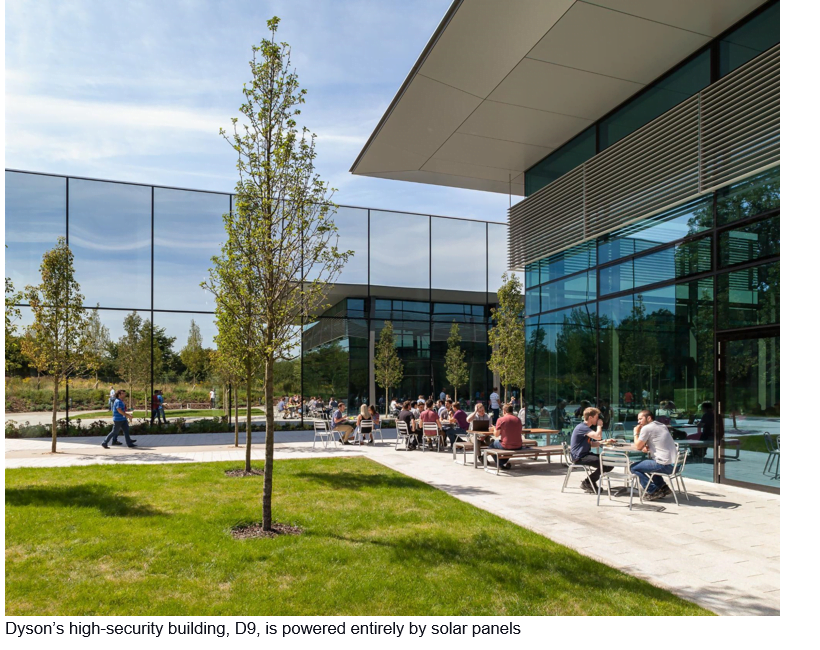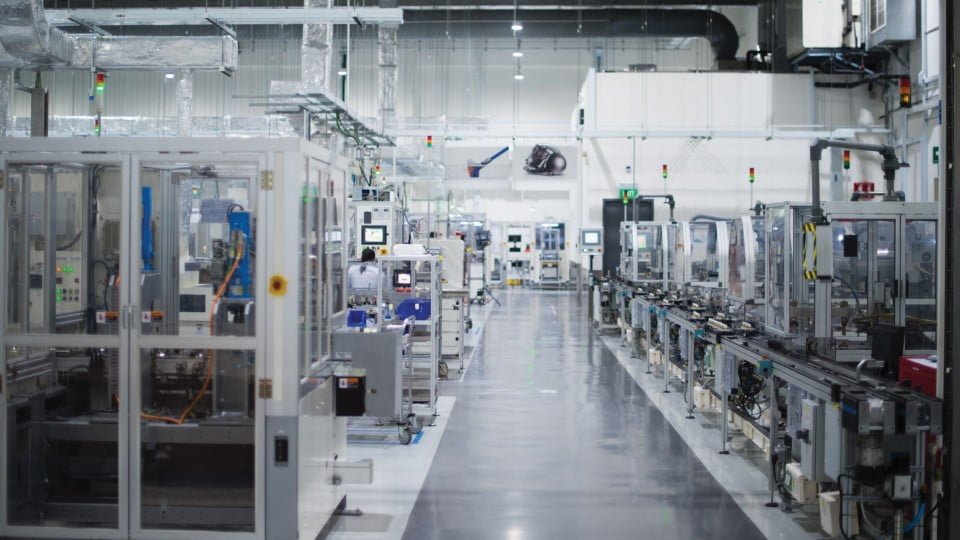Located on the outskirts of the historic market town of Malmesbury, England’s oldest borough, is the Dyson campus. With its sleek, futuristic architecture, high-security clearance, and multitude of tech labs, it’s the antithesis of the medieval town it’s situated in and the vast countryside surrounding it. Yet, at the same time, within its walls, it’s working to preserve those lands and create a more sustainable future for the next generation.
ESG Mena’s Madaline Dunn was recently invited to the Dyson Malmesbury campus to learn how the technology company is striving to do things differently, the importance of empowering customers with data, and its focus on filling the engineering skills gap.
Doing more with less
A mantra repeated many times at the Malmesbury campus was “do more with less,” a tech-informed approach driven by a desire for greater efficiency and sustainability. And this is something that has been embedded within the company since the beginning. Of course, this was first demonstrated when founder Dyson removed the dust bag from the vacuum cleaner, eliminating single-use plastic while enhancing performance and suction. Since then, this has been applied to everything from motors to magnets.

While touring the campus, Chris Osborn, Head of New Product Sustainability, explained how the company’s commitment to continuous R&D has resulted in creating its digital motors, which are smaller, use far less material, consume less energy and are more efficient than the old conventional brushed motors. The sheer weight difference between the two motors demonstrates how the motors have evolved over the years.
This motor transformation has been pivotal in enabling Dyson engineers to change the format of its vacuums, too, making them more lightweight and versatile.

The impact of this was witnessed when visiting Dyson’s top-secret robotics lab in Hullavington, housed in Hangar 86, where Dyson’s automotive engineers once worked on its electric vehicles. The enormous bright-white hangar on the former MOD site is abuzz with innovation, and there, the recently unveiled Dyson 360 Vis Nav robot vacuum was developed. A fraction of the size of the first vacuum and using energy-saving software, it provides six times the suction of competing brands.

This so-called ‘lean engineering’ approach is also seen in its hand dryers, which prevent paper waste, and produce up to 85% less CO₂ than paper towels, its long-lasting LEDs and its hairdryer’s recycled magnets, containing 100% recycled neodymium.
Empowering customers with environmental data
While vacuum cleaners are Dyson’s bread and butter, its expertise spans from hair, dust and air science, to hand hygiene and lighting, with its air purifiers a particularly interesting piece of tech. Having launched in 2015 and undergoing several iterations, its air purifying technology detects and removes pollutants from the air while equipping customers with the data to better understand their environment and air quality. This is facilitated through the LCD and accompanying MyDyson app.

According to Sam Railton, Environmental Care Category Manager, the screen “unlocks an education.” Four million smart Dyson purifiers are connected worldwide, mapping indoor air quality at a large scale. “It’s important for us to feed that information back so that our owners not only use the product effectively but are aware of pollution sources,” said Railton. “This awareness allows people to make changes in their own lives.”
Dyson took this one step further with its Air Quality Backpacks, equipped with a full sensor suite, providing key insights into air quality outside, with a breakdown of particulates. With this tech, King’s College London conducted the Breathe London project with 200 school children to understand their level of pollutant exposure (PM2.5, PM10, and Nitrogen dioxide) on the school run.
In London, 9,400 premature deaths are attributed to poor air quality, while one in three schools is located nearby roads with illegal levels of NO2 pollution.
As a result of the study, 31% of the children altered their school journey, demonstrating that, as Railton highlighted, by making people aware of the problem, you can “help change the trends.”
Indeed, the company’s recently launched Dyson Zone headphones with air purification now allow customers to do this daily as its first wearable air purifier. “We give customers the data to help them change habits, and if they can’t change their habits by adapting their behaviour, Dyson finds the solution with its products,” said Railton.
Filling the engineering skills gap
Alongside finding solutions to everything from the paper towel problem to mechanical motors, Dyson is also working on solving a bigger issue: the engineering skills gap.
Research shows that 19.5% of engineers currently working in the UK are set to retire in the next three years. This is not good news for the planet, with the recent net–zero workforce report revealing that to meet net-zero 2050, the UK needs a workforce geared toward green jobs, many of which will require engineering skills and other STEM backgrounds. Dyson is on a mission to change this.

In 2002, the company launched the James Dyson Foundation to dispel misconceptions about engineering and energise young people’s interest in such careers. Funded by Dyson’s profits, the charity works with learners ages four to 18, providing schools with free workshops, events and resources. It has also devised intervention projects, such as the Bath School Project, which resulted in three times as many female students being interested in an engineering career and one and a half times as many students choosing to study design technology at GCSE level.
Another branch of this is the James Dyson Award, an international design competition and one of its flagship projects. Currently running in 30 countries worldwide, including the UAE, the competition challenges engineering students and recent graduates to design a product that solves a global problem.
One of the recent winners of the Sustainability Award is Industrial and Product Design graduate Jerry De Vos from the Netherlands, who created The Plastic Scanner, a hand-held device which identifies whether plastic is suitable for recycling. Another winner, The Tyre Collective, from Imperial College London and the Royal College of Art, created a device that captures microplastic particles from tyres. Winners receive £30,000 and international media exposure; 70% of global winners are now commercialising their inventions.
Alongside the foundation, after being challenged by former Universities Minister Jo Johnson to solve the skills gap, Dyson decided to launch his own university: The Dyson Institute of Engineering and Technology.

The student population is small, 160 undergraduate engineers across four years, and from day one, students work alongside experienced engineers three days a week on live Dyson projects while studying for two. There are no tuition fees, and accommodation fees are taken directly from the students’ salaries. In their first year, students reside in the modular village in 26 m² pods made by WilkinsonEyre, and feature furniture designed by James Dyson himself. They also receive cooking lessons from Michelin-star-trained head chef Joe Croan, trained by the Michelin-starred Marco Pierre White, and free haircuts and Dyson-farmed food.
But, aside from the perks and debt-free education, as impressive as they are, the key feature of the Institute is that it truly encourages students to challenge conventional thinking and find innovative solutions to the world’s problems.
Right now, the biggest challenge we face is the climate crisis. By embedding this sustainability-informed problem-solving mindset in students from the beginning of their career journey, Dyson is laying strong foundations for the future of engineering, which in turn, holds the key to building a more sustainable future.




